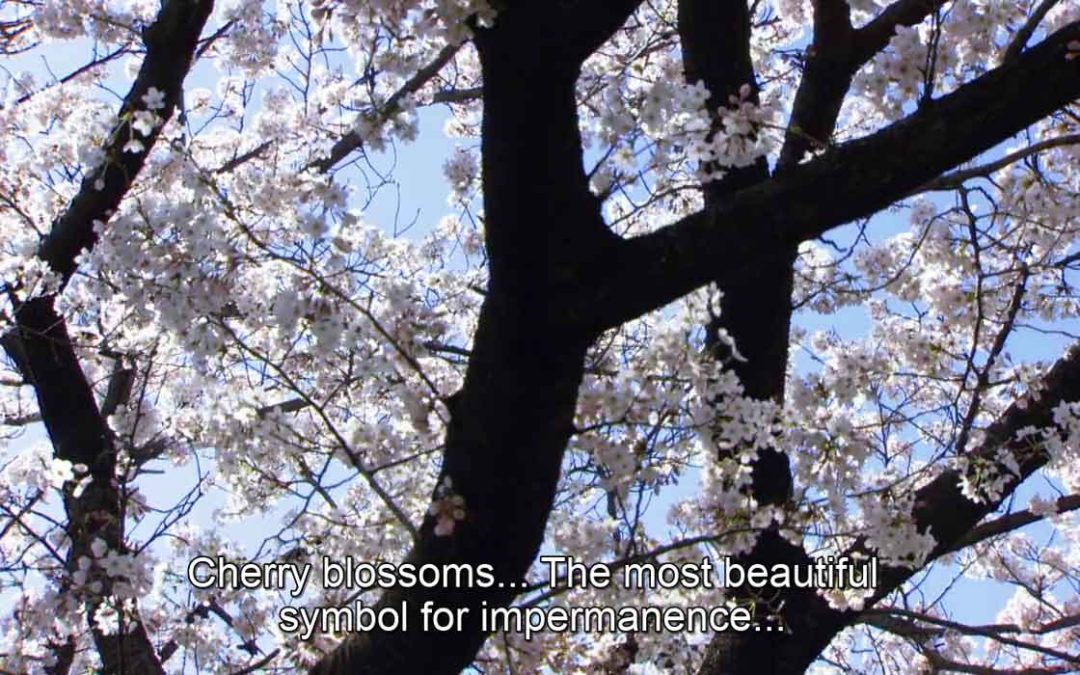Cherry blossoms
One of the stories in the movie takes place during the cherry blossom season at the beginning of spring in Japan. Cherry Blossoms(Hanami in Japan, and ) is celebrated about ten days as families, friends, and visitors gather under trees while their pink and white flowers are in full bloom.
The cherry blossom is seen as a symbol of beauty, awakening, and the transience of life. In a haiku, Issa has written:
“In the cherry blossoms’ shade
There is no such thing as a stranger.”
A summarized background:
The film tells the story of Rudi, who is terminally ill, but he doesn’t know that. Only his doctor and his wife, Trudi, know how serious his condition has truly become. As Trudi wrestles with whether or not to break the news to her ailing husband, the doctor recommends to her that the couple perhaps do something that they have been planning for years but could never find the time to fit into their busy schedules. Later, after convincing Rudi to travel with her to Berlin and visit their family for the first time in years, the couple is heartbroken to realize that their children have no time for them. When Trudi suddenly passes away and Rudi realizes that he never knew his wife as well as he wanted to or expressed his affection in a way that truly reverberated, the widower is devastated to discover just what sacrifices Trudi had made to be with him. In the aftermath of that discovery, Rudi dedicates his remaining days to realizing Trudi’s unfulfilled dreams and
A detailed background:
Trudi (Hannelore Elsner) and Rudi (Elmar Wepper) have been married for many years and live in a small Bavarian town. She is a dreamer interested in the arts and adventure. He works as a civil servant in the Department of Waste Management. She wanted to become a dancer and move to Japan. He is very much caught up in the regular routines of his life which he follows diligently: taking the train to work and eating a sandwich and an apple for lunch. She desires change, and he fears change. Despite their differences, they have forged a strong marriage and live alone now that their three children are grown.
Learning that Rudi only has a short time to live, Trudi convinces him to take a trip to Berlin to visit two of their children. He reluctantly agrees to go but is not excited by the journey. While she struggles to find the right moment to tell her husband about his imminent death, their two children, a son (Felix Eitner) with wife and kids, and a lesbian daughter (Birgit Minichmayr) and her lover, only have a limited amount of time to give to their parents. They make it quite clear that they have little in common across the generations.
Trudi decides to leave Berlin for a visit to the Baltic Sea, a place she finds romantic and soothing. While they are there, she unexpectedly dies peacefully in her sleep. Rudi returns to their home and is unable to cope with his feelings of loneliness and guilt. For the first time in his life, he realizes that he never really
The story of Rudi’s spiritual journey to Japan unfolds slowly, and we are able to sense the courage it takes for him to make such a trip in order to commune in a very real way with Trudi. Karl, who has never been close to his father, spends a lot of time at work. He misses his mother and like Rudi regrets that he wasn’t more attentive to her.
Rudi is delighted to be in Tokyo during Hanami, cherry blossom time. In an
“One has to give love a chance to reveal itself in its greatest pain and strength. That’s why the Japanese sit under the cherry
In the park, Rudi sees and meets Yu (Aya Irizuki), a teenage Butoh dancer. He is drawn to her since Trudi had an immense fascination with this art form and yet never had a chance for it to blossom. One day Rudi shows up dressed in Trudi’s skirt, sweater, and necklace beneath his coat. He surrenders himself to Yu who touches his heart with her craft and friendliness. That is why he chooses her to accompany him on a pilgrimage to Mount Fuji, a powerful place that Trudi reverenced from Bavaria. The moving finale to Cherry Blossoms is a tour de force which vividly conveys the inherent beauty and profundity of impermanence.
You will shed tears as you watch this film.
Personal Note:
I think I should plan to celebrate this Hanami in Japan soon. Any willing adventurer?

